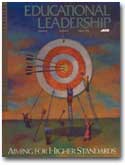Self-Awareness In Language Arts
Self-Awareness In Language Arts, Rosemarie S. Hughes and Pamela C. Kloeppel.
This manual shows how to meet basic curriculum demands in reading, writing, speaking, and listening, while shoring up three areas in which many economically and emotionally disadvantaged children are weakest—self-esteem, decision making, and peer relationships. For each of these areas, Hughes and Kloeppel present 36 field-tested lesson plans—six each for grades K–5. Most incorporate facilitative skills—open-ended questions, active listening, unconditional positive regard, feedback and confrontation, and group responsibility for progress. The lessons, which include copy-ready handouts, can serve equally well as a springboard for a conflict resolution program.
Available from the Educational Media Corporation, Box 21311, Minneapolis, MN 55421-0311. (612) 781-0088. 1994. 224 pp. Paperbound. $19.95.
First Things First
First Things First: What Americans Expect from the Public Schools, Jean Johnson and John Immerwahr.
The public's top two priorities for public schools, according to the findings of this national survey are: (1) making schools safe and orderly, and (2) returning to the basics. Public Agenda, a nonpartisan, nonprofit public opinion research group, queried 1,100 Americans, half of whom had children in public schools. An overwhelming majority felt these basic issues must be addressed before we can raise academic standards, and they were suspicious of experimental teaching techniques at the expense of the basics.
Among other findings: Roughly 40 percent were in favor of combining students of different achievement levels in one class, and roughly 32 percent were opposed. (Seventy-two percent felt average learners are neglected as teachers tend to students at the extremes.) Eighty-one percent felt high school students should not be allowed to graduate until they demonstrate they can write and speak English well. On all these issues, white, African-American, and traditional Christian parents responded similarly.
Available from Public Agenda, 6 East 39th St., Suite 900, New York, NY 10016. (212) 686-6610. 1994. 56 pp. Paperbound. $10; half price for 10 copies or more.
Changing the Odds
Changing the Odds: Middle School Reform in Progress, 1991–1993, Anne C. Lewis.
To improve the education of young adolescents, the Edna McConnell Clark Foundation in 1989 awarded grants to five urban school systems—in Baltimore, Louisville, Milwaukee, Oakland, and San Diego. Lewis chronicles the results at 12 participating schools, which include refined teaching skills and improved student attendance and performance. Significantly, the strides were made even as poverty, violence, and family and community instability rose in surrounding neighborhoods.
Among the approaches detailed is a middle school algebra project that helps students put their math to everyday use; and the Higher Order Thinking Skills Project in several San Diego schools, which has replaced “drill-and-kill” remedial classes with lessons that stress critical thinking. Student profiles, photos, a bibliography, and a list of resource groups are included.
Available from the Edna McConnell Clark Foundation, Office of Communications, 250 Park Ave., Suite 900, New York, NY 10177-0026. (212) 551-9100. 1993. 128 pp. Paperbound. Free.
Magazines for Kids and Teens
Magazines for Kids and Teens, edited by Donald R. Stoll.
This is a new, expanded version of the popular Magazines for Children (1990). It catalogues 249 publications, indexed by both age/grade and subject matter. Stoll, who is executive editor of EdPress, collaborated with the International Reading Association.
Available from Educational Press Association of America, Rowan College of New Jersey, 201 Mullica Hill Rd., Glassboro, NJ 08028. (609) 256-4610. 1994. 101 pp. Paperbound. $10. ($7 for EdPress members), plus $2.50 shipping and handling.
Standards for Student Performance
Standards for Student Performance, Kathryn Weiss; and Achieving Equity and Excellence Through Improved Assessment, Karin M. Hilgersom.
These two special-subject bulletins from the Oregon School Study Council explore the need to rethink student performance standards and the growing resistance to assessment used solely to test and judge. Weiss looks at national legislation and at legislation in Oregon and vocational standards. Hilgerson, in addition to examining assessment at a California high school and at New York's Central Park East Senior Institute, highlights the California Learning Assessment System, which aims to hold Chapter 1 students to the same high standards as others.
Both authors address the ambitious New Standards Project, a consortium of 17 states and 6 leading school districts, that is designing new standards, assessment methods, and professional development approaches. Both bulletins include bibliographies. Available from the Oregon School Study Council, 1787 Agate St., University of Oregon, Eugene, OR 97403. (503) 346-2334. March and April 1994. 40 pp. each. Softcover. $7 each; volume discounts: 15 percent off 10–24 copies, 20 percent off 25–49 copies, and 25 percent off 50+ copies.
